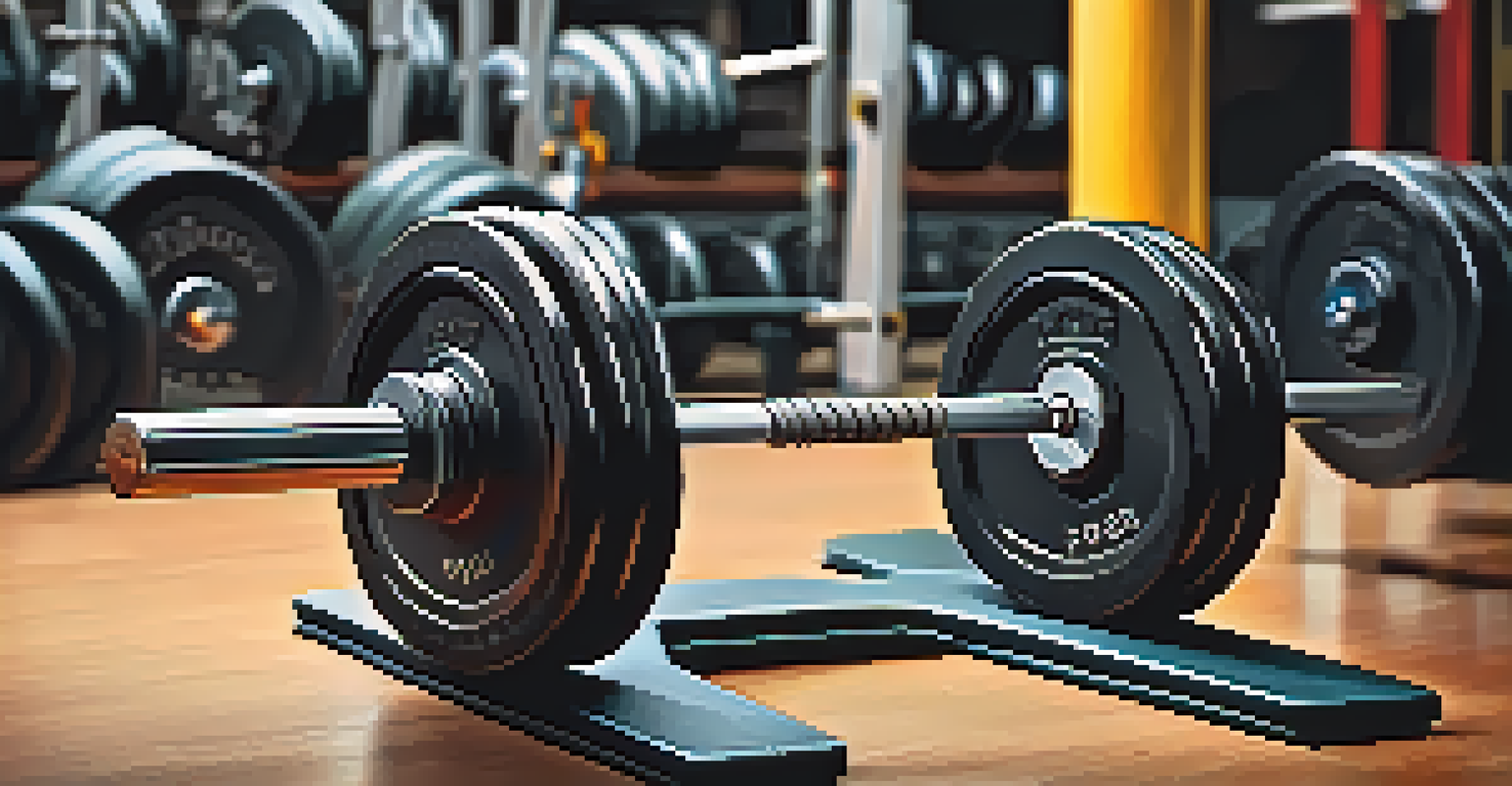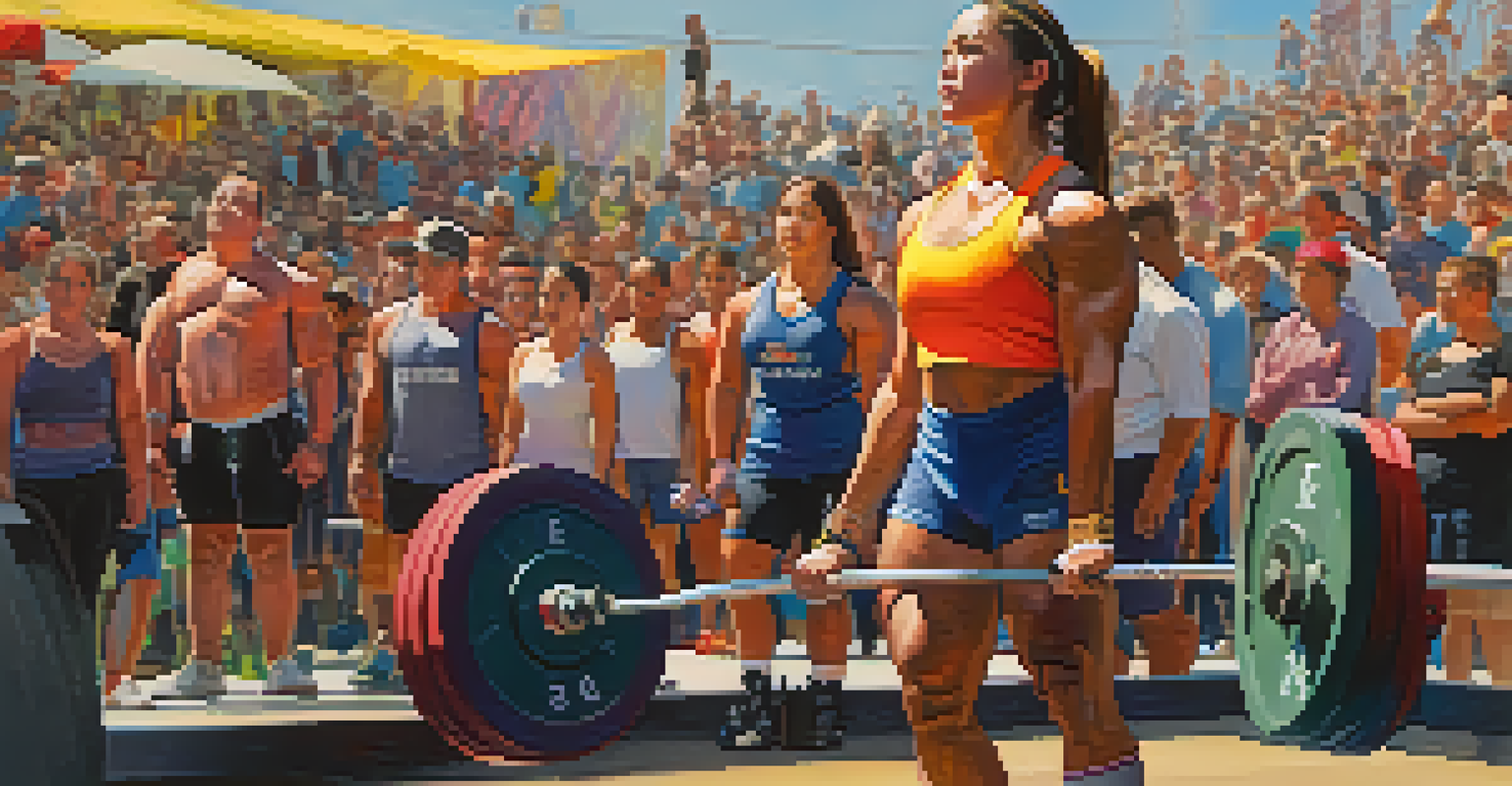How Powerlifting Builds Mental Toughness and Resilience

Understanding Mental Toughness in Powerlifting
Mental toughness is the ability to push through challenges and stay focused under pressure. In powerlifting, this means not just lifting heavy weights but also developing the grit to overcome setbacks. Every lift is a test of both physical and mental strength, requiring lifters to confront their limitations head-on.
Strength does not come from physical capacity. It comes from an indomitable will.
As lifters train, they learn to navigate discomfort and fatigue, which builds resilience. Each successful lift reaffirms their capability, reinforcing a positive mindset. This continuous cycle of challenge and achievement fosters a strong mental foundation that extends beyond the gym.
Ultimately, the journey of powerlifting teaches individuals how to manage stress, set realistic goals, and stay committed—a recipe for mental toughness. This mindset can be applied in various aspects of life, from personal challenges to professional hurdles.
The Role of Goal Setting in Building Resilience
In powerlifting, setting specific goals is crucial for progress. Whether it's aiming for a new personal record or perfecting a technique, these milestones keep lifters motivated. Each small achievement builds confidence, contributing to an overall sense of resilience.

As lifters strive to meet their goals, they encounter obstacles that test their determination. Overcoming these hurdles strengthens their resolve and prepares them for future challenges. This process teaches the importance of perseverance in the face of adversity.
Mental Toughness in Powerlifting
Developing mental toughness involves overcoming challenges and setbacks, which enhances both physical and mental strength.
Moreover, the satisfaction of reaching a goal, no matter how small, reinforces a positive mindset. This not only enhances their powerlifting journey but also cultivates a resilient attitude that can be beneficial in other areas of life.
Facing Failure and Learning from Setbacks
Failure is an inevitable part of powerlifting, whether it’s missing a lift or feeling fatigued during training. However, these moments are opportunities for growth. Learning to accept failure as a stepping stone rather than a setback is crucial in developing mental toughness.
It’s not whether you get knocked down, it’s whether you get up.
When lifters fail, they are faced with a choice: to give up or to analyze what went wrong and try again. This reflection process is essential to building resilience, as it encourages a growth mindset. Embracing failure fosters a deeper understanding of one’s limits and potential.
By viewing setbacks as learning experiences, lifters not only improve their skills but also strengthen their resolve. This ability to rebound from failure translates into other life situations, reinforcing the idea that resilience is built through experience.
The Community Aspect: Support and Accountability
Powerlifting often fosters a strong sense of community among lifters. This support network plays a vital role in building mental toughness. Encouragement from peers helps individuals stay accountable and motivated, even during tough times.
Being part of a community means sharing experiences, both good and bad. Lifters celebrate each other’s successes and provide comfort during failures. This camaraderie creates a safe space where individuals can express vulnerability while also gaining strength from others.
Goal Setting Builds Resilience
Setting specific goals in powerlifting motivates lifters and helps them develop perseverance through overcoming obstacles.
Moreover, witnessing others overcome challenges can inspire personal resilience. The community aspect of powerlifting teaches the importance of collaboration and support, reminding us that we are stronger together.
Discipline: The Backbone of Mental Toughness
Discipline is at the core of any successful powerlifting regimen. Committing to a training schedule, maintaining proper nutrition, and prioritizing recovery all require a level of discipline that builds mental toughness. Each day of training reinforces the habit of sticking to a plan, even when motivation wanes.
This consistency not only leads to physical improvements but also strengthens mental fortitude. Lifters learn to push through discomfort, developing a mindset that values commitment and perseverance. Over time, this discipline becomes second nature, bolstering resilience.
The lessons learned through disciplined training extend far beyond powerlifting. They teach individuals how to manage their time, prioritize goals, and stay focused on long-term success, making discipline a vital component of mental toughness.
Visualization Techniques for Enhanced Performance
Visualization is a powerful tool used by many successful athletes, including powerlifters. By imagining successful lifts and positive outcomes, lifters can enhance their performance and build confidence. This mental practice creates a strong connection between the mind and body, essential for executing lifts effectively.
Engaging in visualization helps lifters prepare for competitions and challenging training sessions. By mentally rehearsing their lifts, they can reduce anxiety and improve focus during actual performance. This technique fosters a resilient mindset by reinforcing belief in one’s capabilities.
Community Support Enhances Growth
A supportive powerlifting community fosters accountability and resilience, encouraging individuals to share experiences and inspire one another.
Furthermore, visualization can be used to prepare for overcoming obstacles. By envisioning themselves successfully navigating challenges, lifters equip themselves with the mental tools needed to tackle real-life situations, enhancing their overall resilience.
The Lasting Impact of Powerlifting on Life Skills
The lessons learned through powerlifting often extend beyond the gym. The mental toughness and resilience gained can have a profound impact on everyday life. Whether facing challenges at work, in relationships, or personal pursuits, the skills developed in powerlifting can be incredibly beneficial.
For instance, the discipline cultivated during training can translate into improved time management and productivity in professional settings. Similarly, the ability to handle pressure and setbacks prepares individuals for high-stress situations, fostering greater emotional resilience.

Ultimately, powerlifting teaches individuals that they are capable of more than they realize. This newfound confidence and strength can empower them to tackle life's challenges head-on, demonstrating that the benefits of powerlifting reach far beyond physical strength.